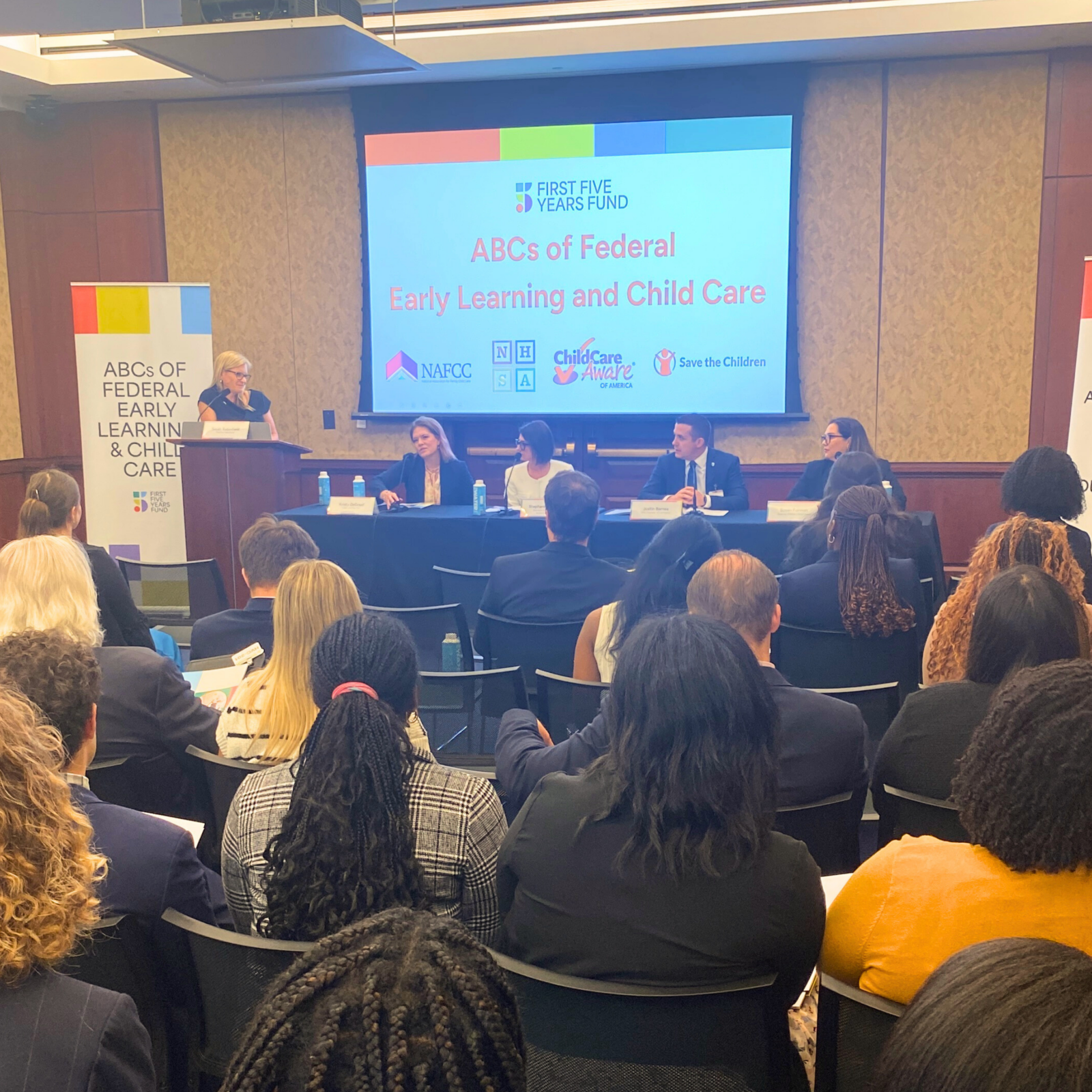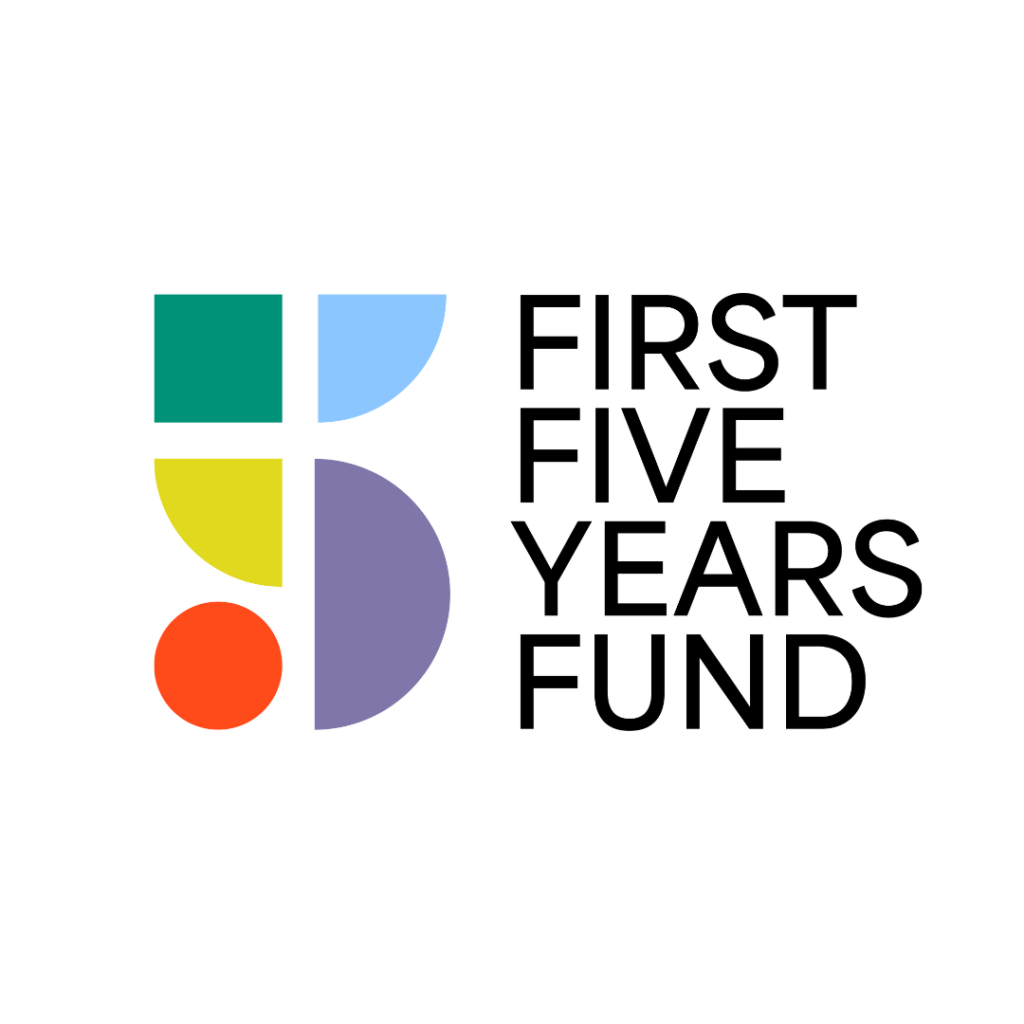FFYF Hosts Child Care and Early Learning Briefing on Capitol Hill

WASHINGTON, D.C. – The First Five Years Fund (FFYF) hosted Congressional staff for its annual bipartisan “ABCs of Federal Child Care and Early Learning” briefing. The session focused on the importance of federal early learning and child care programs and the need for robust funding through the annual appropriations process.
Rep. Suzanne Bonamici (D-OR) and Brian Fitzpatrick (R-PA), co-chairs of the Bipartisan Pre-K and Child Care Caucus, spoke to the crowd about ongoing bipartisan efforts to protect and prioritize funding for early learning and child care. A panel of experts from Louisiana, Ohio, Oklahoma, and Utah spoke about how federal programs support families, businesses, and providers in their communities – and why protecting and approving robust funding for these programs through Congressional appropriations is so critical.
Below are excerpts from panelists’ testimonies, who spoke about the Child Care and Development Block Grant (CCDBG) program, Head Start and Early Head Start, and the Preschool Development Grant Birth through Five (PDG B-5):

Rep. Brian Fitzpatrick (R-PA):
“Programs like Head Start and Early Head Start aren’t optional—they’re a launchpad for our kids and a promise to our families. I’ve fought to protect them at every turn, and I’m not backing down. This is my top priority…because this program isn’t negotiable—our kids and families are counting on it.“
Rep. Suzanne Bonamici (D-OR):
“Investing in children is the best investment we can make. It makes all other work possible. It’s good for kids, it sets them up for success. This is a bipartisan effort where Democrats and Republicans understand the importance of early childhood funding. There is no market solution for child care – we really need these investments.”
“Our efforts to expand [CCDBG} funding have really helped states make progress addressing the needs of children, families and providers. But there’s still room to grow, it’s only serving a fraction of eligible kids.”

Kristy DeGraaf, Home-Based Child Care Provider, Cedar Learning Tree (Utah)
On the importance of federal funding for her work
“Right at this very moment, Child Care Development Block Grant (CCDBG) funds provide for about half of my program funding. I’m in a rural area and the wages in my area are very low, but providers still have to make a living and run their businesses. The block grant money has been foundational in providing for kids at the highest risk.”
On how federal funding promotes parental choice
“Parents have such a variety of needs. Having options for families that they can make work is really vital. There’s not a lot of great options in our community.”
Susan Forman, Assistant Program Director, Save the Children | Head Start (Louisiana)
“The average cost of child care is about 11,000 a year. In Louisiana, it’s $315/average a week. For someone in Louisiana making minimum wage – if they have child care 52 weeks a year 40 hours a week – they’re in the negative. Head Start is very important for those families who are having to choose between working or paying for child care. A lot of times, they’re having to choose not to work because they simply can’t afford it.”
“A lot of people think Head Start is just child care – but it’s so much more than that. We serve children and families who are at or below the poverty level. A lot of times we’re the only child care available to younger children who aren’t able to go to school yet. We provided resources and opportunities that they may not otherwise have access to.”
Stephanie Lippert, Deputy Director, Oklahoma Partnership on School Readiness
“PDG B-5 has helped us use programs that were already embedded in communities to help us better serve families, especially when it comes to child care. We introduced telehealth and teletherapy to anyone working in licensed child care. Many times child care workers don’t have access to benefits or can’t afford them. We’re also offering categorical child care for those working in child care. It’s great workforce recruitment and retention because the workforce is a huge issue in child care.”
“We have expanded literacy programs and we’ve really been able to focus on the rural areas of oklahoma. We focused our efforts on expanding what really works.”
Justin Barnes, Director of Federal Government Affairs, Ohio Chamber of Commerce
“Child care issues are a net drain of about five and a half billion dollars on our state’s economy. And that’s a huge burden for not just our economy but for our businesses and employers.”
“There are tremendous opportunities to access federal investments. We consistently hear that child care is a huge issue.”
“More and more business owners are becoming wise to the fact that child care is an issue for their ability to retract and retain talent. The more that we can do to tackle child care for working parents the better off the state’s going to be because the labor force participation will go up and it’s going to be better for employers.”
Sarah Rubinfield, Managing Director, Government Affairs, First Five Years Fund:
“Families with young children need support now. They can’t push pause on their child care needs and hope to deal with it a few years down the road – kids don’t work like that.”
“We can bring peace of mind to working families. We can ensure every child receives safe, reliable, and nurturing care. And we can support the providers and employers who are vital to making that happen. To provide meaningful, affordable options for parents, we must continue to invest in these critical programs.”
Federal child care programs benefit families, businesses, and local economies in all 50 states. But at current investment levels, federal child care programs only reach a fraction of income-eligible families. Right now, Democratic and Republican lawmakers are circulating “Dear Colleague” letters on Capitol Hill, offering members of Congress an opportunity to support increased appropriations funding for the federal early learning and care programs. FY2026 “Dear Colleague” letters can be found here.
The briefing was co-hosted by Child Care Aware of America, National Head Start Association, The National Association for Family Child Care (NAFCC), U.S. Chamber of Commerce Foundation, and Save the Children.
Subscribe to FFYF First Look
Every morning, FFYF reports on the latest child care & early learning news from across the country. Subscribe and take 5 minutes to know what's happening in early childhood education.



